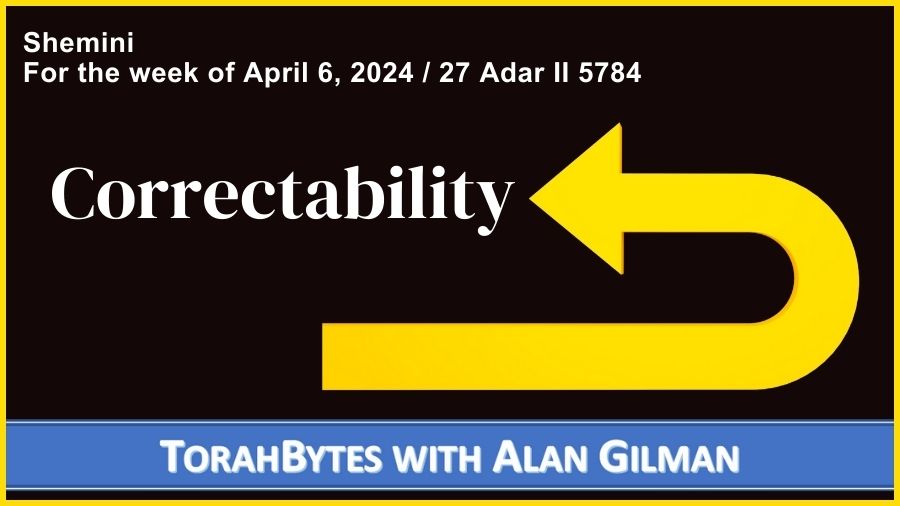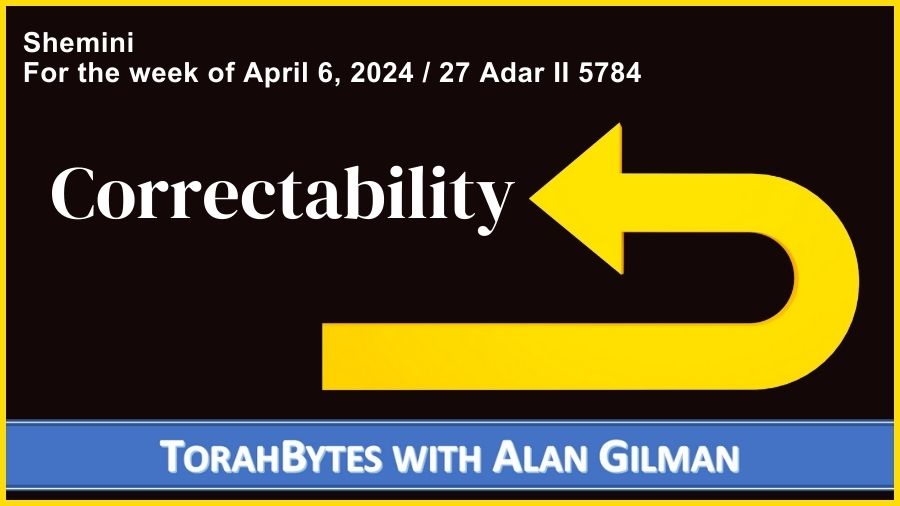
Correctability
For the week of April 6, 2024 / 27 Adar II 5784

Shemini
Torah: Vayikra/Leviticus 9:1 – 11:47; Shemot/Exodus 12:1-20
Haftarah: 2 Shmuel/2 Samuel 6:1 – 7:17
Replaced by: Ezekiel 45:16-46
Note: This following message was intended to be based on this week’s Haftarah (selection from the Hebrew Prophets). From time to time, the regularly scheduled Haftarah is preempted by a special selection due to that particular Shabbat’s proximity to a festival or other special occasion (see this article for more information). This is something I am usually aware of when preparing my weekly TorahBytes message. However, for some reason, I failed to notice the special reading and prepared the following based on the regularly scheduled one. I decided to post what I wrote anyway. Perhaps you will catch the irony. —Alan Gilman
And Nathan said to the king, “Go, do all that is in your heart, for the LORD is with you.” But that same night the word of the LORD came to Nathan, “Go and tell my servant David, ‘Thus says the LORD: Would you build me a house to dwell in?’” (2 Shmuel/2 Samuel 7:3-5)
After King David’s throne was secure, having unified the tribes of Israel and having brought peace to the land, he had it in his heart to build a permanent house for God. According to Torah, God’s dwelling was to be in the form of the mishkan (English: tabernacle), the complex, semi-portable, national center for sacrifice. After erecting and dismantling the mishkan as needed during the years of Israel’s wanderings, it eventually came to rest in Shiloh about forty-five kilometers (thirty miles) north of Jerusalem. In the days of Eli, the cohen ha-gadol (English: the high priest), the central furnishing of the mishkan, the ark of the covenant, was captured by the Philistines. Many years later, after David became king, he brought it to Jerusalem where it was housed in a tent.
It troubled David that he himself dwelt in a permanent dwelling, while the ark of God dwelt in a tent. The ark signified the presence of God among the people of Israel. To David, God’s appointed earthly king had more dignified housing than the heavenly king of all kings. So, he brought his concern to the prophet Nathan. From their interaction and what follows, it’s clear that Nathan understood David wasn’t simply sharing a concern but also had a specific plan in mind: to build a permanent house for God. To Nathan, this was a great idea, and he told David so.
Nathan was correct to assume that God was with David and apparently viewed David’s grand building project in line with all he understood about both David and God. It must have been gratifying to David to get the prophet’s green light to proceed.
But sometime later (the wording sounds as if it wasn’t that much later), God speaks to Nathan, contradicting what Nathan had earlier said to David. David was not to build him a house. It would be his son who would do it instead. This in no way undermines what David envisioned. Far from it! According to First Chronicles, the plans for the temple were given to David by God. We read, “All this he made clear to me in writing from the hand of the Lord, all the work to be done according to the plan” (1 Chronicles 28:19). David was indeed inspired to build a permanent dwelling for God. It’s understandable that this being the case, both David and the prophet assumed that David would oversee the project, that is, until God said otherwise.
I cannot tell you how impressed I am by Nathan! Acknowledged as a prophet of God, he green lights David’s temple project, but then has to go back and say that he got it wrong. He not only received the message of correction; he also delivered it.
God did reveal more to Nathan than a simple correction of something like, “Yes, but not you and not now.” God gave Nathan a good deal of detail regarding his plans for David’s dynasty, the nature of which would have likely cushioned any sense of negativity that was included. But still, Nathan was open to God’s correcting what he had said to King David and was willing to tell him so.
How many of us would do as Nathan did? You might think, “If God would speak to me as clearly as he spoke to Nathan, of course I would!” Do you really think your openness to correction, especially after you’ve gone on record with regard to a matter, is based on how clearly God speaks to you? In any way that we might discover we have misrepresented God’s will—be it an interpretation of Scripture or how we might understand its implications in our lives or the lives of others—would we be as quick as Nathan to say so?
How often are we too embarrassed to admit that we’ve been wrong? And if we are not correctable in small things, do we think that we will be correctable in divine things? Nathan’s correctability should inspire us to consider what’s at stake here. For those of us who claim to know the God of Truth, we must commit ourselves to that truth at all costs. What’s the alternative?
Scriptures taken from the English Standard Version